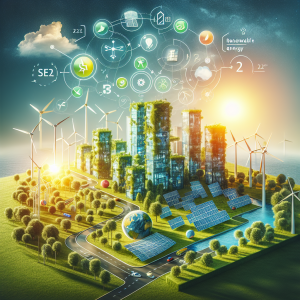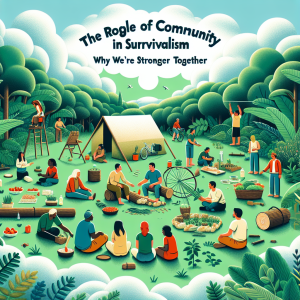The Importance of Eco-Friendly Education for Future Generations
Eco-friendly education represents a pivotal shift in how we approach the learning and development of future generations. In a world facing pressing environmental challenges, integrating sustainability into educational frameworks is not just beneficial but essential. This systemic transformation ensures that students are equipped with the knowledge and skills necessary to address and mitigate issues like climate change, resource depletion, and biodiversity loss.
Incorporating eco-friendly education into school curriculums fosters environmental literacy from a young age. Environmental literacy involves understanding the complexities of environmental issues and recognizing individual and collective responsibilities towards fostering a sustainable planet. By nurturing this awareness early on, education systems can cultivate informed citizens who are capable of critical thinking and problem-solving associated with global environmental challenges.
In addition to enhancing environmental understanding, eco-friendly education can significantly improve academic performance. Studies have shown that lessons incorporated with outdoor, nature-based activities can enhance students’ concentration and retention rates. This pedagogical approach not only makes learning more engaging but reinforces concepts by allowing students to observe their practical applications directly. For example, a lesson on plant biology taught through a hands-on gardening project provides experiential learning opportunities that traditional classroom settings often lack.
Moreover, eco-friendly education equips students with 21st-century skills that are increasingly in demand. As global industries shift towards more sustainable practices, the job market continues to evolve, favoring candidates who possess skills in sustainability and environmental stewardship. Students who undergo eco-friendly education are better prepared to enter careers in green industries, ranging from renewable energy to sustainable agriculture. This adaptability is crucial in a rapidly changing economic landscape, where innovation in sustainability is a robust driver of career opportunities.
Communities also stand to gain significantly from integrating eco-friendly strategies in schools. Schools that embody eco-friendly practices often influence the broader community, serving as models of sustainability. Initiatives, such as school-wide recycling programs or energy conservation projects, when successfully implemented, inspire local residents to adopt similar measures. This ripple effect can lead to a broader cultural shift towards sustainability, furthering environmental goals at a communal level.
Furthermore, eco-friendly education fosters a strong sense of personal responsibility and agency in students. By engaging in sustainability projects, students learn about the impact of their actions on the environment. This realization promotes a sense of accountability and empowers students to make conscious choices that contribute to environmental preservation. For instance, students who experience the benefits of recycling firsthand are more likely to continue such practices outside the school environment, thereby reinforcing positive behaviors.
The role of technology in eco-friendly education cannot be overstated. Educational technology solutions, such as virtual simulations and interactive modules, offer dynamic platforms for students to explore environmental concepts. These tools can demonstrate complex processes, like the carbon cycle or ocean current systems, in an accessible and captivating manner. Through technology, students can engage with global case studies, allowing them to analyze environmental challenges from different cultural and geographic perspectives. Additionally, technology facilitates global collaboration among students, fostering a sense of a shared, global responsibility toward sustainability.
In practice, implementing eco-friendly education involves a multi-faceted approach. It starts with the physical environment—schools can adopt energy-efficient technologies, such as solar panels, and design lessons focused on energy conservation. Classroom materials can be assessed and selected based on their environmental impact, reducing reliance on non-renewable resources. Curriculum design should integrate interdisciplinary learning, linking subjects such as science, economics, and social studies through the lens of sustainability. This interconnectedness reflects the real-world nature of environmental issues, underscoring their complexity and interdependence.
Teacher training is another critical component. Educators should be equipped not only with subject matter expertise but also with skills to promote sustainable thinking. Professional development programs focusing on sustainability can help teachers bring innovative teaching practices into the classroom, making ecological concepts pertinent and relatable. Importantly, involving students in the planning process for such initiatives can enhance their engagement and commitment, as they are more likely to invest in programs where they feel a sense of ownership and contribution.
Parents and guardians play an equally important role in the success of eco-friendly education. Encouraging environmentally responsible behaviors at home complements what is taught in schools, creating a holistic learning environment where students can practice and reinforce sustainable behaviors. Schools can engage parents through workshops, newsletters, and community events, building a support network that underscores the importance of sustainability.
It is crucial to recognize that while there are challenges in transitioning to eco-friendly education—such as budget constraints, resistance to change, or the need for significant curriculum overhauls—the long-term benefits far outweigh the drawbacks. Grants and funding opportunities for educational institutions interested in pursuing green initiatives are becoming more prevalent, supported by both governmental and non-governmental organizations.
Overall, eco-friendly education is more than an educational trend; it is a sustainable imperative that ensures future generations are prepared to inherit and manage a world where environmental considerations are central to decision-making. By embedding eco-friendly values in education today, we lay the foundations for a more sustainable, equitable, and thriving world tomorrow.




